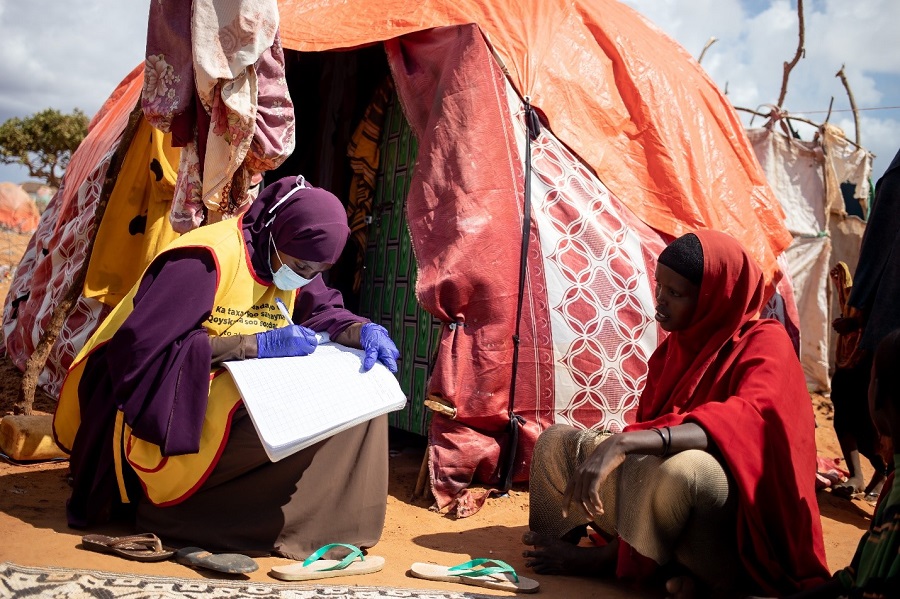 WHO-supported community health worker conducting house-to-house visits in an internally displaced persons camp in Kismayo, Jubaland. Credit: WHO/Ismail Taxta
WHO-supported community health worker conducting house-to-house visits in an internally displaced persons camp in Kismayo, Jubaland. Credit: WHO/Ismail Taxta
Mogadishu, 6 February 2023 – The Government of Japan has recently allocated a grant to the World Health Organization (WHO) country office in Somalia to expand access to life-saving health care for vulnerable communities living in hard-to-reach areas that are severely impacted by the ongoing drought. With 7.8 million people in need of humanitarian assistance, the current drought is one of the worst in Somalia’s history.
Recognizing the need for an urgent response to save lives, the Government of Japan has provided these funds through the Japanese Supplementary Budget. This funding will be used to strengthen community-based health and nutrition interventions, as well as support primary health care and nutrition stabilization centres in the hard-to-reach areas. This funding will allow WHO to bring health care close to these vulnerable communities living in catastrophic living conditions and improve access to basic and lifesaving health care services in some of the worst hit areas in the country. The funding will also be used for real-time detection and response to any epidemic by frontline health workers.
The Government of Japan has been a global leader in enhancing universal health coverage and the Sustainable Development Goals’ core principle to ensure that “no one is left behind.” This partnership between WHO and the Government of Japan will help to improve access to health care for drought-affected communities, especially those living in hard-to-reach areas and contribute to building a resilient primary health care system, which are foundational for achieving universal health coverage in fragile settings.
“Ensuring that no one is left behind is central to the achievement of universal health coverage,” says H.E. Ken Okaniwa, Ambassador of Japan to Somalia. “This funding will support WHO and the Government of Somalia to meet the urgent health care needs of people affected by the severe drought and food insecurity crisis, including women and children who bear the brunt of these catastrophic events, as well as contributing to the resilience and capacity of the health system into the future.”
Targeting 29 of the districts most affected by drought, the funding will support WHO to deploy community health workers in hard-to-reach areas and also provide outreach services for the vulnerable communities. Approximately 2.78 million vulnerable people including over 300 000 internally displaced people living in catastrophic and dire living conditions in these areas are expected to benefit from this expanded life-saving health care support.
WHO will also provide essential medical supplies, including life-saving medicines, to the primary health care units and nutrition stabilization centres across these districts. This will help these basic health care units to meet the extra demand for health care and continue with routine and essential health care services without any disruption. As the epidemic risk is very high in these vulnerable communities owing to poor access to water and sanitation services, WHO’s support through the deployment of community health workers and community outreach services will ensure that frontline health workers detect and respond to any health threats early on.
“We welcome this funding from the Government of Japan and extend our utmost gratitude for the support. We look forward to an ongoing partnership, rooted in our shared commitment to universal health coverage which is also anchored in building a resilient primary health care system,” said the WHO Representative to Somalia Dr Mamunur Rahman Malik. “With famine looming and millions of people impacted by the unprecedented drought, we must act now to save lives and prevent major outbreaks of infectious diseases. We know that in cases of prolonged food insecurity and famine, more people die from disease than from malnutrition and hunger combined. It will be children, women and other vulnerable people who will pay the price of our inaction. We have the tools to prevent children dying from malnutrition, to stop the spread of diseases like cholera and measles and to avert unnecessary, preventable deaths. With a coordinated, scaled-up response, made possible by donors like the Government of Japan, we can save thousands of lives if we act now.”
Background information
WHO has been able to reach nearly 6.3 million people, about 75% of the people who are in need, with life-saving treatments, essential health and nutrition interventions. These services are being delivered through over 2164 community health workers, 148 mobile outreach teams, 64 stabilization centres and 280 primary health care centres in drought-affected districts. Somalia is currently facing one of the most severe droughts in its history, with a looming famine and possibility of severe loss of life due to hunger, malnutrition and disease. Currently, 7.8 million people are affected and 1.1 million are displaced (on top of 2.5 million who were already displaced) as they are in search of food, water, shelter, health care and any assistance available. Furthermore, the drought is increasing endemic-prone diseases, putting millions at risk. For example: 3.5 million persons lack sufficient access to water; and 6 million continue to face severe food shortages, with approximately 1.4 million children facing acute malnutrition, including 329 500 likely to become severely malnourished. Moreover, as of 31 December 2022, a total of 15 635 cases of cholera, including 87 deaths (case-fatality rate 0.6%), were reported from 26 drought-affected districts. In addition, 132 617 cases of acute diarrhoeal disease and 17 536 measles cases were also reported during the same period in the drought-affected districts.
For additional information, please contact:
Kyle DeFreitas
External Relations Officer
Fouzia Bano
Communications Officer
Related links


